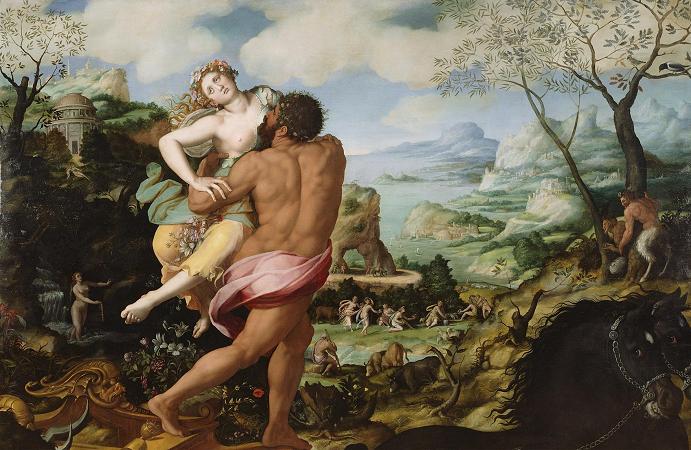Proserpina / Persephone. Proserpina or Proserpine is an ancient Roman goddess whose cult, myths and mysteries were combined from those of Libera, an early Roman goddess of wine, and the Greek Persephone and Demeter, goddesses of grain and agriculture. The originally Roman goddess Libera was daughter of the agricultural goddess Ceres and wife to Liber, god of wine and freedom. In 204 BC, a new Greek-style cult to Ceres and Proserpina as Mother and Maiden was imported from southern Italy, along with Greek priestesses to serve it, and was installed in Libera and Ceres' temple on Rome's Aventine Hill. The new cult and its priesthood were actively promoted by Rome's religious authorities as morally desirable for respectable Roman women, and may have partly subsumed the temple's older, native cult to Ceres, Liber and Libera; but the new rites seem to have functioned alongside the old, rather than replaced them. Just as Persephone was thought to be a daughter of Demeter, Romans made Proserpina a daughter of Demeter's Roman equivalent, Ceres. Like Persephone, Proserpina is associated with the underworld realm and its ruler; and along with her mother Ceres, with the springtime growth of crops and the cycle of life, death and rebirth or renewal. Her name is a Latinisation of Persephone, perhaps influenced by the Latin proserpere, with respect to the growing of grain. Her core myths-her forcible abduction by the god of the Underworld, her mother's search for her and her eventual but temporary restoration to the world above-are the subject of works in Roman and later art and literature. In particular, Proserpina's seizure by the god of the Underworld-usually described as the Rape of Proserpina, or of Persephone-has offered dramatic subject matter for Renaissance and later sculptors and painters. In early Roman religion, Libera was the female equivalent of Liber. She was originally an Italic goddess; at some time during Rome's Regal or very early Republican eras, she was paired with Liber, also known as Liber Pater, Roman god of wine, male fertility, and a guardian of plebeian freedoms. She enters Roman history as part of a Triadic cult alongside Ceres and Liber, in a temple established on the Aventine Hill around 493 BCE. The location and context of this early cult mark her association with Rome's commoner-citizens, or plebs; she might have been offered cult on March 17 as part of Liber's festival, Liberalia, or at some time during the seven days of Cerealia; in the latter festival, she would have been subordinate to Ceres. Otherwise, her relationship to her Aventine cult partners is uncertain; she has no known native mythology. Libera was officially identified with Proserpina in 205 BCE, when she acquired a Romanised form of the Greek mystery rites and their attendant mythology. In the late Republican era, Cicero described Liber and Libera as Ceres' children. At around the same time, possibly in the context of popular or religious drama, Hyginus equated her with Greek Ariadne, as bride to Liber's Greek equivalent, Dionysus. The older and newer forms of her cult and rites, and their diverse associations, persisted well into the late Imperial era. St. Augustine observed that Libera is concerned with female fertility, as Liber is with male fertility. Proserpina was officially introduced to Rome around 205 BCE, along with the ritus graecia cereris, as part of Rome's general religious recruitment of deities as allies against Carthage, towards the end of the Second Punic War. The cult originated in southern Italy and was probably based on the women-only Greek Thesmophoria, a mystery cult to Demeter and Persephone as Mother and Maiden. It arrived along with its Greek priestesses, who were granted Roman citizenship so that they could pray to the gods with a foreign and external knowledge, but with a domestic and civil intention. The new cult was installed in the already ancient Temple of Ceres, Liber and Libera, Rome's Aventine patrons of the plebs; from the end of the 3rd century BC, Demeter's temple at Enna, in Sicily, was acknowledged as Ceres' oldest, most authoritative cult centre, and Libera was recognised as Proserpina, Roman equivalent to Demeter's daughter Persephone. Their joint cult recalls Demeter's search for Persephone, after the latter's rape and abduction into the underworld by Hades. At the Aventine, the new cult took its place alongside the old.
more...














